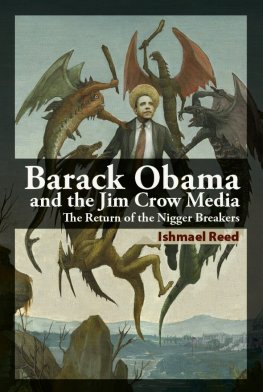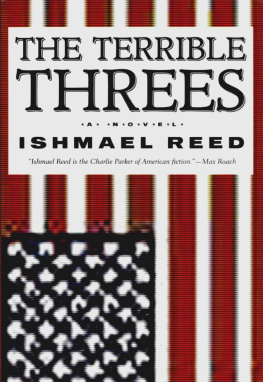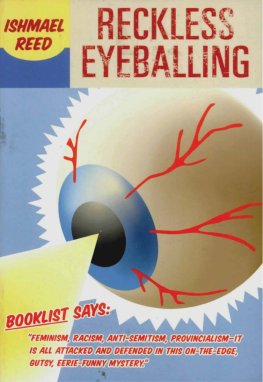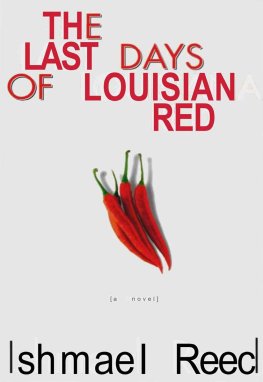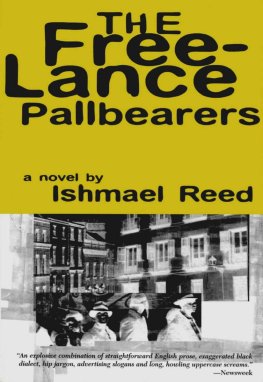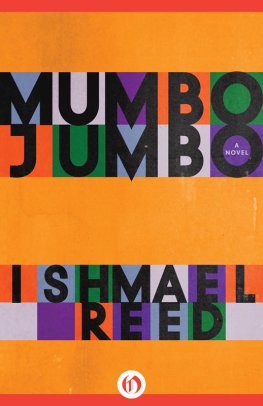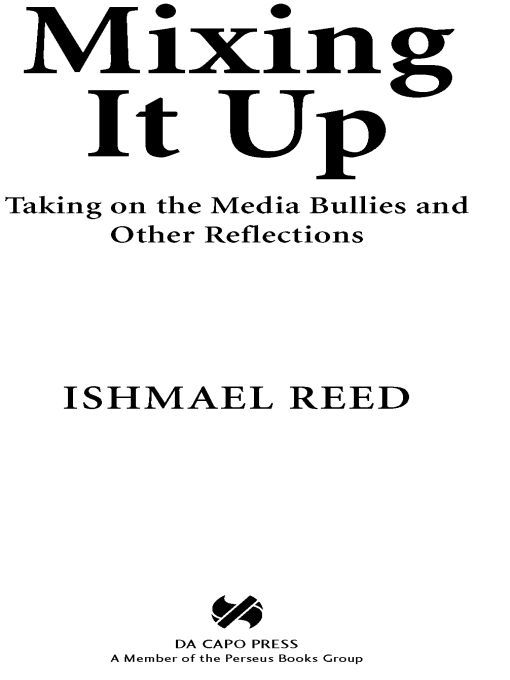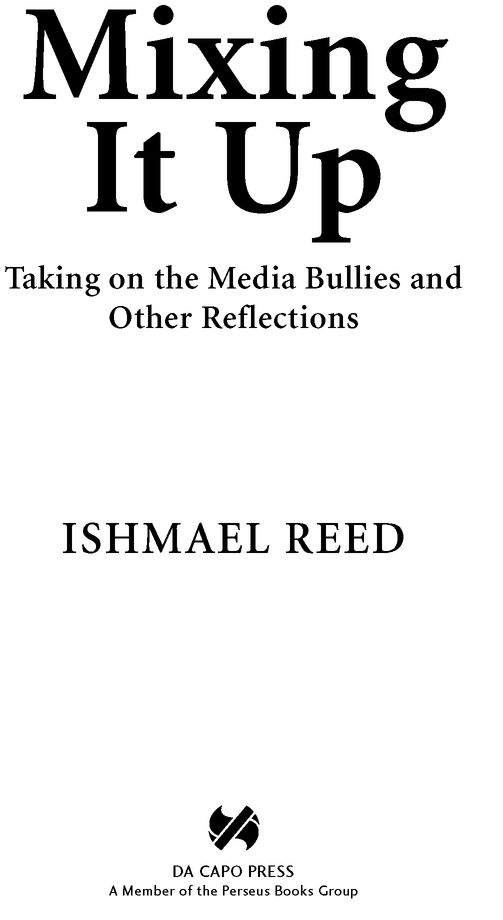Table of Contents
ALSO BYISHMAEL REED
COLLECTED WORKS
The Reed Reader
NOVELS
The Free Lance Pallbearers
Yellow-Back Radio Broke-Down
Mumbo Jumbo
The Last Days of Louisiana Red
Flight to Canada
Reckless Eyeballing
The Terrible Twos
The Terrible Threes
Japanese by Spring
POETRY
Conjure: Selected Poems, 1963-1970
Chattanooga
A Secretary to the Spirits
New & Collected Poems 1964-2007
ESSAYS AND NONFICTION
Blues City, a Walk in Oakland
Another Day at the Front, Dispatches from the Race War
Airing Dirty Laundry
Writin Is Fightin
God Made Alaska for the Indians
Shrovetide in Old New Orleans
ANTHOLOGY EDITOR
From Totems to Hip-Hop: A Multicultural Anthology of
Poetry Across the Americas, 1900-2001
Pow Wow: American Short Fiction from Then to Now
PL AYS
Body Parts (Formerly Tough Love)
C Above C Above High C
The Preacher and the Rapper
Hubba City
Savage Wilds
Mother Hubbard
In memory of Jerry Pope, educator and Gary Webb, journalist
Whoever controls the media, the images, controls the culture.
ALLEN GINSBERG
Introduction
Since the publication of Another Day at the Front, Ive written a number of essays, some of which have been published in the New York Times (where my first op-ed appeared in 1973), Playboy (which my mother requested I not send her in the mail, claiming that at ninety and as an author of her own published book, Black Girl from Tannery Flats, she had enough attention from her neighbors), Le Monde, and Green Magazine, which is devoted to professional golf. A Spanish magazine called Matador also ran an essay included in this collection. Others appeared in the San Francisco Chronicle and TIME magazine. Some have been published in anthologies.
Essay collections allow me to gather my public reflections in one place, as well as respond to critics, some of whom, like John H. McWhorter, through the efforts of the Manhattan Institute, have access to millions of readers and listeners. I dont expect NPR, one of the many outlets available to the well-funded Manhattan Institute, to invite me on to rebut his trivialization of my views, but unlike the black underclass, which has taken a pounding from media bullies over the past thirty years, I have an opportunity to talk back, and now, for the first time, with the advent of bloggerspace, so do they.
A writer for the Anglo-Irish National Review, Mark Goldblatt, referred to me as reliably silly. When I reached him and asked him to elaborate, he wrote a letter claiming that in comparison to me he was an insect. When he was assigned to review Airing Dirty Laundry for the same Irish American magazine that was thrilled by Charles Murrays The Bell Curve, he refused to do so he wrote, as a favor to me. I wish he had presented my views. I could have reminded some of those National Review Italian, Irish, and Jewish American readers and contributorsthe new Aryanshow they started out. They didnt arrive here on Carnival Cruise. At one time, the Anglos were hostile to Italian, Irish, and Jewish immigrants and considered them to be genetically damaged.
Those West Coast Italian immigrants who were political prisoners during World War II and the Italian American citizens whose movements were restricted during that time would be awed by the current leader of white supremacy, Rudolph Giuliani, an Italian American whose political philosophy is guided by the Manhattan Institute. Some firefighters say that he wasnt the hero of 9/11 and that the drastic reduction in New York crime began under Mayor David Dinkens. But mainstream journalists, who are adverse to homework and do the bidding of people like Rudolph Murdoch, enabled him as they enabled George W. Bush. One hopeful sign in 2008 was the voters rejection of Giulianis using racial code words as part of his campaign appeal. He constantly bragged of his crime fighting and welfare reform accomplishments.
Goldblatt said the issues I was concerned with are no longer relevant. Which issues do editors at National Review (NR) find interesting? Well, I saw John Derbyshire, a writer for NR who became a naturalized citizen, recently take questions on C-Spans Washington Journal. When asked his opinion as to why African Americans havent progressed as far as whites economically, he said that the answer might be found in genetics and biology. Incredulous, I sent him an e-mail asking whether he truly believed his comment. His answer came back, Yes, though not likely all. He made that statement without the host challenging him, which calls into question Philip Roths idea that if you say boo to blacks youll lose your job and your wife will perish from a heart attack. So from this answer, I assumed that scientific racism is the new issue of interest to the intellectual establishment. The issues I write about, particularly the continued obstacle to African American progress posed by American institutions and the 24/7 slandering of African Americans by the segregated media, have been placed on the back burner, which is how one commentator put it. He said that issues of the LGBT (lesbian, gay, bisexual, and transgender) communities are, using his image, on the front burner. Even those who are hostile to blacksRudolph Giuliani, Gray Davis, Jerry Brown, and San Francisco Mayor Gavin Newsom (who, according to the San Francisco Bay View newspaper, wants San Francisco to become a white city)are favorable to gay rights.
One thing about National Review, I have to give them credit. They sent a member of their staff to toss off a flippant comment about my ideas. Commentary outsourced the job. One critic noted that seventeen of the researchers whose work is referenced by the book [The Bell Curve] are also contributors to Mankind Quarterly, a magazine with a slant towards racial eugenics. Yet Commentary provided Charles Murray with space to answer his critics.
Commentary founder Norman Podhoretz was an adviser to the Giuliani campaign. In an article entitled His Toughness Problemand Ours, writer Ian Buruma summarizes the Podhoretz and neocon position on blacks. The most articulate analysis of the obsession with power and violence was written by Podhoretz in 1963 in his famous essay My Negro Problemand Ours. Despite what the title might suggest, it is actually an argument against racism and in favor of miscegenation. When Podhoretz grew up in Brooklyn, the common assumption was that Jews were rich and Negroes were persecuted. This was not how things looked to Podhoretz on the playground of his local public school, where poor Jewish boys were regularly beaten up by Negroes: There is a fight, they win, and we retreat, half whimpering, half with bravado. My first experience of cowardice.
Negroes, he goes on, made one feel inadequate. But most important of all, they were tough, beautifully, enviably tough, not giving a damn for anyone or anything.... This is what I envied and feared in the Negro.


